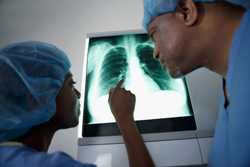Multidrug-resistant Tuberculosis: Tools for Tackling a New Face of an Old Foe
Tuesday, March 18, 2014, at 1 p.m. – 2 p.m.

Tuberculosis is an ancient disease that remains an important global cause of morbidity and mortality. In most cases, TB can be treated and cured by taking a combination of several drugs for 6 to 12 months. When inappropriate or incomplete treatment takes place, however, TB bacteria can develop resistance to multiple drugs. Treatment of drug-resistant TB is currently longer, more toxic, more complex, and less effective than for drug-susceptible TB. In 2011, less than 10% of the total estimated multidrug-resistant TB (MDR TB) cases were detected and annually, there are approximately 500,000 cases of MDR TB, and 150,000 deaths. Although there are simple rapid tests that have improved the diagnosis of the disease, there is immense potential to increase the number of persons diagnosed with MDR TB, and diagnose them more quickly so that they can begin treatment sooner.
Please join us as we discuss how more patients can benefit from advances in diagnostic and treatment options, resulting in an overall reduction in morbidity from MDR TB. This session of Grand Rounds will also explore the role of CDC, WHO and other partners in combating this public health epidemic.
Presentation
Beyond the Data Beyond brings you "take home" messages for you to use in your practice, in your classroom and in your home.
Dr. John Iskander and Dr. Sarita Shah discuss the public health burden of multidrug-resistant tuberculosis (MDR TB) and the new tools that are available for more accurate diagnosis and treatment of MDR TB. Revolutionary tests will allow for faster diagnosis and new drugs offer better treatment with fewer side effects, but patients and providers must also do their part to combat this health epidemic
Patients must:
- Come to their providers in a timely fashion and
- Complete the full course of treatment
Providers must:
- Improve diagnosis and treatment of drug susceptible TB and
- Emphasize proper Infection control practices
Presented By
Sarita Shah, MD, MPH
Associate Chief for Science, International Research and Programs Branch, Division of TB Elimination
National Center for HIV/AIDS, Viral Hepatitis, STD, and TB Prevention, CDC
“The Public Health Importance of Drug-resistant Tuberculosis”
Tom Shinnick, PhD
Associate Director for Global Laboratory Activities, Division of TB Elimination
National Center for HIV/AIDS, Viral Hepatitis, STD, and TB Prevention, CDC
“Rapid Diagnosis of MDR TB: A Laboratory Systems-based Approach”
Christian Lienhardt, MD, DTM, MSc, PhD
Senior Research Advisor, Stop TB Department,
World Health Organization, Geneva, Switzerland
“Rational Use of New Drugs for Treatment of MDR TB: Context and Challenges”
Tom Kenyon, MD, MPH
Director, Center for Global Health, CDC
“Drug Resistance in TB: What Public Health Can Do Now and in the Future”
National Center for Chronic Disease Prevention and Health Promotion, CDC
Facilitated By
John Iskander, MD, MPH, Deputy Scientific Director, Public Health Grand Rounds
Susan Laird, MSN, RN, Communications Manager, Public Health Grand Rounds
Related Grand Rounds Presentations
- TB & HIV: A Deadly Duo
- Advanced Molecular Detection
- Combating Resistance: Getting Smart About Antibiotics
Additional Resources
- Page last reviewed: January 10, 2014
- Page last updated: January 10, 2014
- Content source:
- Centers for Disease Control and Prevention
- Page maintained by: Office of Associate Director of Communication, Division of Public Affairs



 ShareCompartir
ShareCompartir